Minority AIDS Initiative Funding & Programming
OVERVIEW
The goal of the MAAETC’s Minority AIDS Initiative (MAI) is to provide education, training, and technical assistance to enhance the capacity of minority-serving healthcare professionals (HCPs) and institutions across U.S. Public Health Service (USPHS) Region 3. Although minorities make up 36% of the general population, they represent only about 10% of physicians, nurses, and dentists.1
Between July 1st, 2019, and June 30th, 2024, the MAAETC trained 24,468 unique (unduplicated) healthcare professionals, 10,144 of whom (41%) self-identified as members of racial and/or ethnic minority groups. Among the 2,405 healthcare providers (HCPs) who care for people with HIV (PWH), at least 48% reported that more than half of their patients are from minority populations.
1. Association of American Medical Colleges (AAMC). 2024. U.S. Physician Workforce Data Dashboard. https://www.aamc.org/data-reports/report/us-physician-workforce-data-dashboard.
OUR APPROACH
The goal of this component is to train and offer technical assistance (TA) and communities of practice (CoPs) to minority providers and HCPs serving minorities to improve the quality of and access to care for minority persons with HIV and those at risk of acquiring HIV. It also aims to facilitate changes within service delivery to develop more inclusive care environments, operations, and interactions to increase engagement of minority patients and their families.
This requires the co-location of services in primary care, facilitating referrals, building agency and system partnerships, addressing fiscal and insurance barriers, and improving communication and rapport of health professionals, clinics, and systems.
Our MAI approach is aimed at assuring that clients receive the spectrum of HIV care in conjunction with other healthcare needs and support services to improve and expand patient navigation and medical case management to increase engagement, linkage to care, retention in care, and adherence strategies to increase viral suppression.
COLLABORATION
-
The MAAETC collaborates with minority professional associations—such as the National Medical Association, National Black Nurses Association, and National Dental Association—as well as HBCUs, community-based organizations (CBOs), and faith-based organizations (FBOs). These partnerships ensure meaningful collaboration and feedback from minority populations and those with lived experience in informing the development, implementation, and evaluation of regional interventions.
-
All LPs are networked with regional Historically Black Colleges and Universities (HBCUs), including the University of the District of Columbia, Cheyney University, Lincoln University, Bowie State University, Coppin State University, Morgan State University, Hampton University, Norfolk State University, Virginia State University, Virginia Union University, Bluefield State University, St. Paul’s College, and West Virginia State College.
-
-
The DC Local Partner (LP), housed at Howard University, offers MAAETC faculty, staff, and collaborators guidance on minority health issues and cultural competence.



